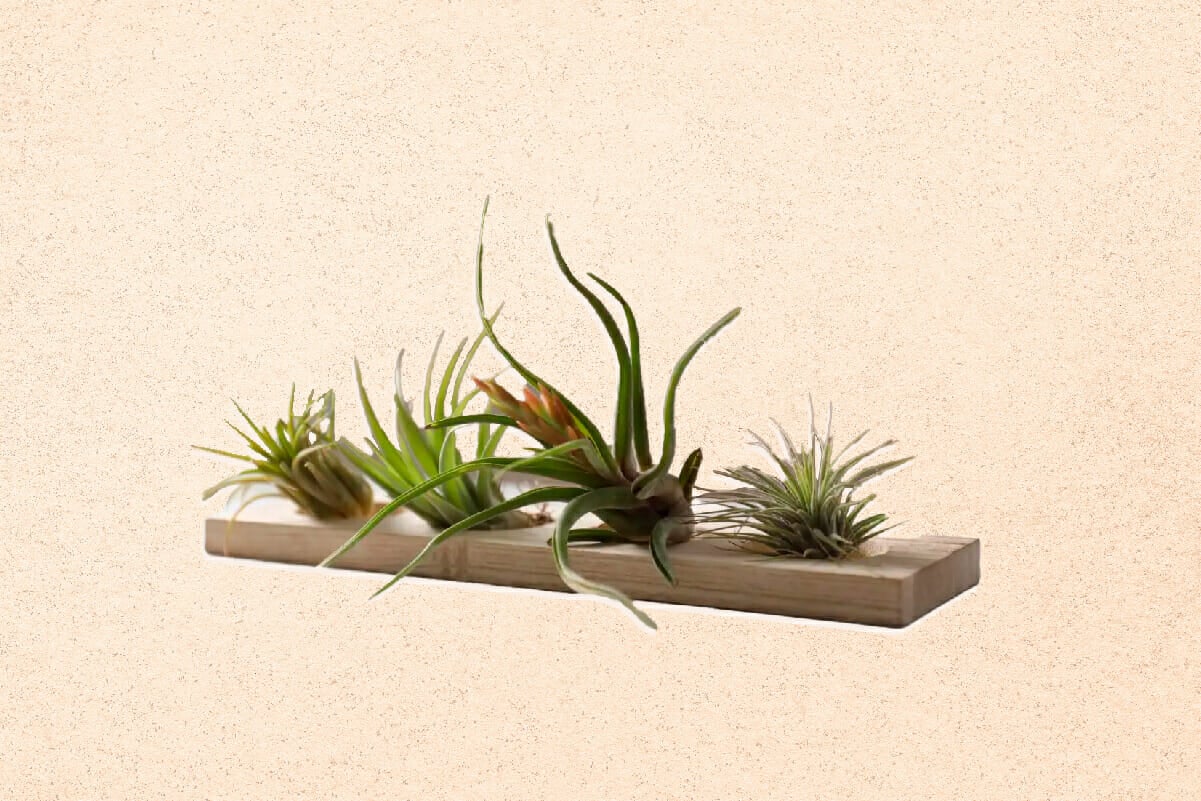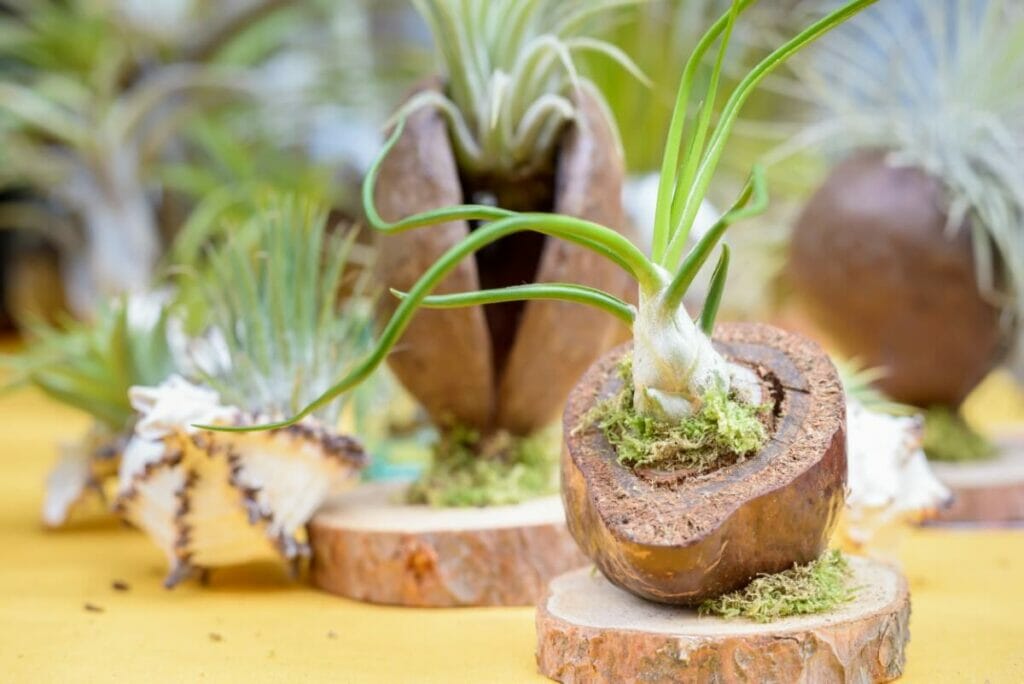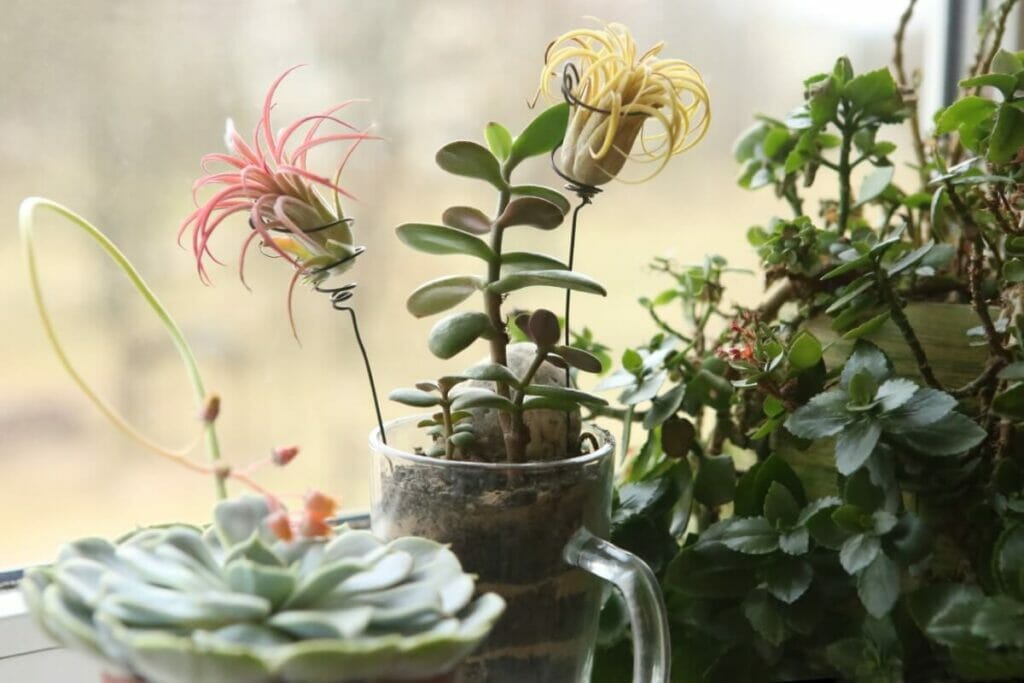Air Plants Are Basically Magic – Here’s 10 Reasons You’ll Want 20 of Them
Air plants are intriguing plants with silvery leaves that come in many different forms. These popular houseplants are incredibly low-maintenance and offer various additional uses and benefits in the home.

10 Uses and Benefits of Air Plants
1) Air Plants Don’t Require Soil
Air plants are unusual in that they don’t need to grow in soil. That’s because air plants are epiphytes that absorb water and nutrients from the air using specialized cells called trichomes.
This impressive ability allows air plants to be grown on almost any surface. Popular surfaces include pieces of driftwood, rocks, wooden plaques, and glass or plastic hanging globes. Because air plants don’t require soil, they can save you lots of mess and money.
2) Air Plants Are Easy to Water

As epiphytes, air plants don’t have traditional root systems that other plants use to absorb water from the soil. Instead, air plants absorb moisture from the surrounding air.
Water air plants by submerging them in room-temperature water for approximately 30 to 60 minutes. Then take them out and let them dry off. Most air plants require watering once a week. However, most air plants require high humidity levels between 50 and 70%.
3) Air Plants Are Easy to Propagate
Not only are air plants reasonably cheap, but you can also use them to get new air plants. Once they bloom for the first time, Tillandsia plants produce baby plants known as pups. Remove the pups once they’re about a third of the size of the parent plant.
A single air plant may produce up to three pups at once. As such, you can quickly expand your air plant collection without spending more money.
4) Air Plants Are Non-Toxic to Pets
If you have pets, selecting non-toxic houseplants is crucial. Thankfully, air plants are non-toxic to pets, including cats and dogs. Air plants are also non-toxic to humans, so they are safe around children.
However, it is still a good idea to prevent your pet or child from consuming air plants. Many air plants are spiky and can cause choking if ingested. Position your air plants safely out of reach of curious pets or children.
5) Air Plants Can Be Good For Feng Shui

Air plants can also help improve the feng shui within your home. Because of how they grow, air plants can help provide a balance between the Wood and Water elements. However, air plants are more strongly associated with the Wood element, which governs creativity, growth, prosperity, and wealth.
According to the Bagua map, the Wood element is associated with the eastern and southeastern areas of your home. Positioning air plants in these locations can boost the power of the Wood element. Air plants can also dispel negative energy that collects in empty spaces.
6) Air Plants May Help Purify the Air
Like many houseplants, air plants may help purify the air within our homes. Air plants use their trichomes to absorb water and nutrients from the air. This has the added effect of removing harmful airborne agents such as VOCs (volatile organic compounds).
VOCs are produced from various household items such as cleaning products, paint, vinyl flooring, and adhesives. Common VOCs include benzene, formaldehyde, toluene, and xylene. According to some studies, exposure to VOCs may increase the risk of cancer.
7) Air Plants May Help Boost Productivity
Adding air plants to your home office or workplace could also help boost your productivity. A study conducted in offices in both the UK and the Netherlands examined how houseplants impacted productivity.
Participants were evaluated twice, first with houseplants in the room and again with the plants removed. The results indicated that participants were 15% more productive and felt less stressed when houseplants were present. The participants also said they felt more engaged.
8) Air Plants Can Help Reduce Stress and Anxiety

Having air plants in your home could also help reduce stress and anxiety. A Korean study conducted in 2015 measured the stress levels of 24 young men while performing two different tasks.
Half of the participants were tested after working at a computer, while the other half were tested after repotting a houseplant. The results found that interacting with the houseplant helped participants feel more comfortable, less stressed, and had lower blood pressure.
9) Air Plants May Improve Your Sleep
Air plants could also improve the quality of your sleep. A Chinese study conducted in 2019 studied how plants affected astronauts’ sleep patterns in long-term isolation.
The data showed that astronauts slept better when they could see, smell, or touch a plant. Astronauts who were close to coriander and strawberry plants also had lower cortisol levels. The astronauts also appeared to regulate their central nervous systems better with plants nearby.
10) Air Plants Could Help Alleviate Allergies
If you suffer from allergies such as asthma or hay fever, some houseplants can exacerbate your allergies. However, air plants may actually help alleviate these problems. Even though air plants can bloom indoors, this is fairly rare. As such, air plants produce less pollen than some houseplants.
Air plants can also help alleviate allergies by removing harmful VOCs from the air. Strong odors and airborne chemicals produced by VOCs can sometimes trigger respiratory allergies like asthma.
Uses and Benefits of Air Plants – Wrapping Up
As we can see, air plants are low-maintenance houseplants with several amazing benefits. Air plants don’t require soil and are easy to water. Air plants may also help purify the air within our homes and can even reduce stress and anxiety.
Edd is a budding content writer and gardener living in the United Kingdom. He has a bachelor's degree in Creative and Professional Writing and has written for several gardening publications online. He is passionate about nature and sustainability with a focus on gardening and wildlife.

